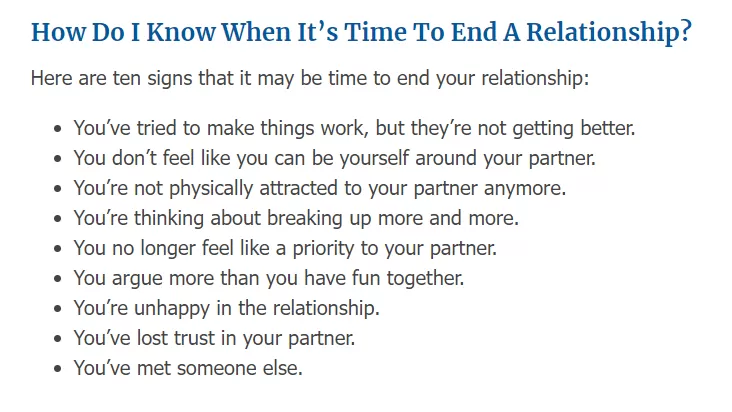Today's Thursday • 6 mins read
Can you break up without hurting your about-to-be ex?
Realistically, no.
But you can handle it sensitively, soften the blow, and ease the way for both of you to move on.
The main point is to break up in a way that they can remember the good memories you shared.
How To Break Up Without Hurting Your Partner
Throughout this difficult conversation, please be respectful with your manners and patient with their emotions.
1. Be Honest and Open
Start by being honest and direct.
Share genuine reasons for your breakup decision. But avoid over-explaining, as this can cause more pain and confusion.
Do not keep them expecting a rekindling of your relationship. Tell them honestly that you cannot see a future together.
Assure them that you are not breaking their trust. Ask if they need your help, but be clear that it won’t mean reuniting.
Open communication, by definition, means people can share their side of the information and ideas freely and honestly without fear of judgment or consequences.
Give them that security. Be kind, be respectful, and let them voice their emotions.
Share your own feelings and insights without blaming or shaming them.

2. Be Clear About The Future
Keep your stand clear. Tell them clearly:
- Are you done with the relationship and breaking up permanently?
- Is this a temporary break to review your priorities about the future of the relationship?
- Do you expect a patch-up after they have made certain changes in their behavior or attitude?
Be clear in your intentions and reasons. This is the only way to have a smooth breakup.
So, allow yourself some time to prepare your thoughts before the conversation.
Go over your speech with a trusted person to check if you’re conveying your message effectively and unambiguously.
Do not get into an argument during the discussion.
Arguments during emotional turmoils don’t settle issues. But rather leave misunderstandings and stresses, and prolong the breakup process.
3. Maintain Your Empathy
Both the person initiating the breakup and the one receiving the news will go through a range of emotions.
Remember, all emotions are valid — but all behaviors are not.
So, acknowledge their pain. Remain sensitive to their feelings throughout the conversation, without being rude, judgmental, or dismissive.
Don’t get aggressive, saying they triggered you — because your triggers are your responsibility.
“Your triggers are your responsibility. It isn’t the world’s obligation to tiptoe around you.”
They may or may not respond in the same way you do. But there is always a good chance that your empathic approach will make them respond similarly.
Some questions need asking in a breakup conversation. But that doesn’t mean you have to lose your empathy.
Actively listening to their responses, and allowing room for their emotional expressions, are a part of this.
This also shows you respect them, even during difficult circumstances.
4. Anticipate Grief
Prepare yourself for the emotional impact your words will have on them.
It will involve many negative emotions, and grief is one of the first to emerge in its many shades.
Grief is a complex emotion that may manifest through various stages of denial, anger, bargaining, depression, and acceptance (DABDA).
Give them the space to process and experience these emotions.
After all, it is a mourning at the death of a relationship.
5. Ensure Closure
Don’t leave the breakup talk in a way that they are not sure if you’re coming back or not.
Give them a proper closure. This will help both of you to move on.
Closure is not just a final goodbye, but also an opportunity to discuss why you think it’s best for you to move on from the relationship.
Acknowledge the love connection you shared. Tell them that breaking up doesn’t minimize any of the positive experiences you have had together.
Patiently discuss why you cannot continue the relationship. Let them know it is an irreversible decision, so they can lay the foundation for healing and building a healthier future.
Let them air their thoughts, feelings, and grievances. Tell them why you did and what you did, without trying to over-explain your actions.
- Don’t make closure a chance to confront them for their “wrongs”
- Balance your statements with tact and genuine feelings
- Offer constructive criticism when appropriate
- Be truthful without being rude or dismissive
- Don’t give out any unwarranted advice
A closure is a final chance to talk about some of the things you won’t get another chance to talk about again.
Leave with a wish and prayer for their healing and growth.
Recognizing When It’s Time to End A Relationship
1. Lack of Trust
First, check if you still trust each other or if it’s broken beyond repair.
Three signs that your partner might no longer be trustworthy:
- They keep checking where you are, but not allowing you to check their whereabouts.
- You discover that they have been keeping secrets, lying, or hiding the whole truth.
- They tell you they are feeling insecure about the future of the relationship.
2. Lack of Support
Next is a glaring lack of support, especially emotional support. They might be going through the motions, doing their duty, but you can sense a lack of support.
Notice:
- Are they often absent during difficult times?
- Are they ignoring your emotional needs?
- Are they avoiding deep discussions?
3. Signs of Cheating
Cheating, in any form (emotional or physical), is a major reason many relationships end.
Some signs of potential infidelity include:
- Increased secrecy or defensiveness.
- Sudden changes in habits or appearance.
- Decreased communication and emotional/physical intimacy.

Remember to talk to your partner before jumping to one-sided conclusions. It will give you a better idea of whether to work through the issues or decide if splitting is the best way forward.
You can rebuild after cheating.
Final Words
After you break up, what do you to heal yourself? These:
- Limit contact with your ex for a healthy detachment process
- Find an activity or hobby that boosts your self-esteem and self-worth
- Reflect on the lessons learned from the relationship to stop repeating them
- Get in touch with your friends, relatives, or new people to help your recovery
Finally, if you feel you cannot handle the breakup, seek therapy or counseling for yourself.
√ Also Read: How To Rebuild Trust After Cheating: Clues From Research
√ Please spread the word if you found this helpful.
• Our Story!
» You deserve happiness! Choosing therapy could be your best decision.
...
• Disclosure: Buying via our links earns us a small commission.